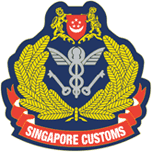Singapore Customs
| Kastam Singapura 新加坡关税局 |
|
 |
|
| Agency overview | |
|---|---|
| Jurisdiction | Government of Singapore |
| Headquarters | 55 Newton Road, #10-01 Revenue House, Singapore 307987 |
| Parent agency | Ministry of Finance (Singapore) |
| Website | www.customs.gov.sg |
Singapore Customs (Abbreviation: Customs; Chinese: 新加坡关税局; Malay: Kastam Singapura;) is a government agency under the Ministry of Finance (Singapore). Singapore Customs was reconstituted on 1 April 2003, after the Customs and Excise Department and the Trade Facilitation Division and Statistics Audit Unit of International Enterprise Singapore (IE Singapore) were merged.
The border function's at the land, air and sea checkpoints were also simultaneously transferred to Immigration and Checkpoints Authority (ICA). Singapore Customs became the lead agency on trade facilitation and revenue enforcement matters. It is also responsible for the implementation of customs and trade enforcement measures including those related to Free Trade Agreements and strategic goods.
The headquarters is located in Revenue House along Newton Road.
The Customs of Singapore is assisting on behalf of the Inland Revenue Authority of Singapore (IRAS) to administer the GST endorsement for the Tourist Refund Scheme (TRS) at its borders' land, air and sea checkpoints:
The Customs department was founded when Singapore was the British Empire's Straits Settlement and later Crown Colony. Established in 1910 under the name Government Monopolies Department, Customs is one of the oldest tax-collecting organisations in modern Singapore to increase the country's state coffers to help fund national programmes. Revenue collection began in December 1909 when the first import duty was imposed on hard liquors. In 1916, the tariff was extended to include tobacco and cigarettes. The collection of duty on petroleum was introduced in 1934. Motor vehicles are also subject to tax and excise duties. Effective 1 January 2012, compressed natural gas (CNG) for motor vehicles is subject to tax and excise duty.
The department has gone through many transitions, mergers and re-organizations in the last century under the government of Singapore. The department's responsibilities in securing Singapore's future are affected by worldwide globalization, market forces and changes in laws, tariffs, trading and traveling trends.
...
Wikipedia
